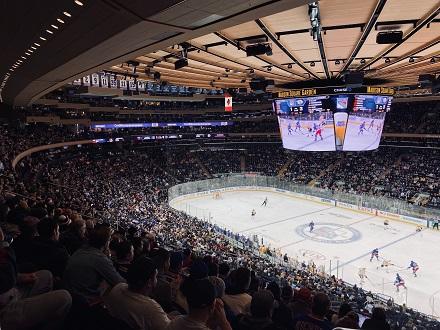

A news article recently quoted National Hockey League (NHL) commissioner Gary Bettman as saying the world's premier ice hockey league would be "very comfortable" with not attending the Beijing 2022 Winter Olympics.
If that’s true, it would mark an abrupt about-face from the first time such an announcement was made, 10 months prior to the 2018 Games in PyeongChang – when players were irate at the idea of missing the Games.
“Way to ruin the sport of hockey even more, Gary,” tweeted former Vancouver Canuck Brandon Prust (@BrandonPrust8). “A huge opportunity to market the game at the biggest stage is wasted,” echoed New York Rangers goaltender Henrik Lundqvist (@HLundqvist30). And Carey Price, a Canadian goaltender for the Montreal Canadiens, had this to say: “You can’t replace the Olympics. I feel like we’re shortchanging some of the younger players that haven’t had that opportunity.”
To date, no word has come from NHL players about the strong possibility of being unable to participate once again.
Breaking News: MLB players will be allowed to participate in the 2020 Summer Olympics
The NHL’s took exception to the disruption caused by the Olympics, which traditionally gutted teams of their best players for the duration of the hockey matches at the Games. Additionally, the NHL cited insurance and travel costs as an enormous expense. (These costs had previously been covered by the IOC, but after the IOC opted to stop paying, the NHL – who might have been seen as the next in line to pick up the tab – also refused to foot the bill.)
Bettman’s remarks on hockey came in response to a statement from International Ice Hockey Federation (IIHF) President René Fasel, setting a deadline of the end of August for the NHL to confirm its involvement in the Olympics. (Fasel said he was giving plenty of notice to the NHL, in contrast to the last time the decision had been announced). It was Fasel’s opinion that the NHL’s PyeongChang withdrawal had a negative impact on the standard of the ice hockey tournament in South Korea – something few will argue.
Fansided notes, “In 2018, the Games suffered as a result, pulling in less ratings and far less interest as a result of the lack of NHL players. The 2018 Winter Olympics were, instead, dominated by the women’s hockey event, where Canada and the United States faced off in a shootout for the gold medal as Team USA enacted revenge on Canada for previous Olympic defeats.”
Of course, there are some who say the NHL missing the Olympics is far from a done deal. Fansided’s coverage included a note that Sportsnet’s Elliotte Friedman has reported that the IOC and the IIHF have “indicated a willingness this week to address NHL issues to get players to go to [the] 2022 Olympics.”
Friedman’s report also states that the IIHF and the IOC are willing to renegotiate with the NHL on issues such as player insurance costs, travel costs, plus the ability for the NHL to promote the Olympics on their own platforms.
This might come as a surprise to Bettman, given his latest statement.
As a side note, there might be the potential for international competition, should the IIFH bring back the World Cup of Hockey, the NHL's own international competition, the World Cup of Hockey, which fits around the NHL season. So far, three editions of this event have been held: in 1996, in host cities Philadelphia and Montreal, and in 2004 and 2016, both in Toronto.
Don’t look for a World Cup in 2020, though, as the NHL and the NHL Players Association (NHLPA) were unable to reach an agreement on it, according to ESPN. There was no immediate word as to when another date might be set.
If Bettman’s statement is true, the lack of NHL involvement will once again open the door to players from other leagues participating. As this article in SDM noted back in April 2017, in the U.S. alone, there are the American Hockey League (the NHL’s farm team), college hockey at both the NCAA and the American Collegiate Hockey Association levels, as well as junior leagues and those who play pond hockey at higher levels. There are also USA Hockey’s U-18 teams, which have done well. In other words, there’s no lack of players to make up a national team for the U.S. And those possibilities could lead to increased interest in other levels of hockey leading up to team selection time, since enthusiasts could start building the buzz about possible contenders for spots on Team USA.

